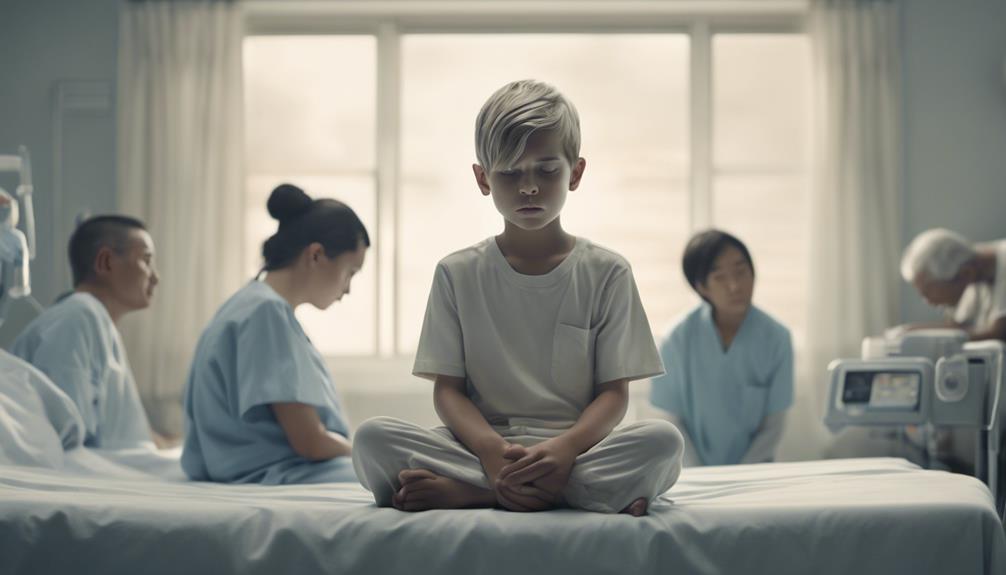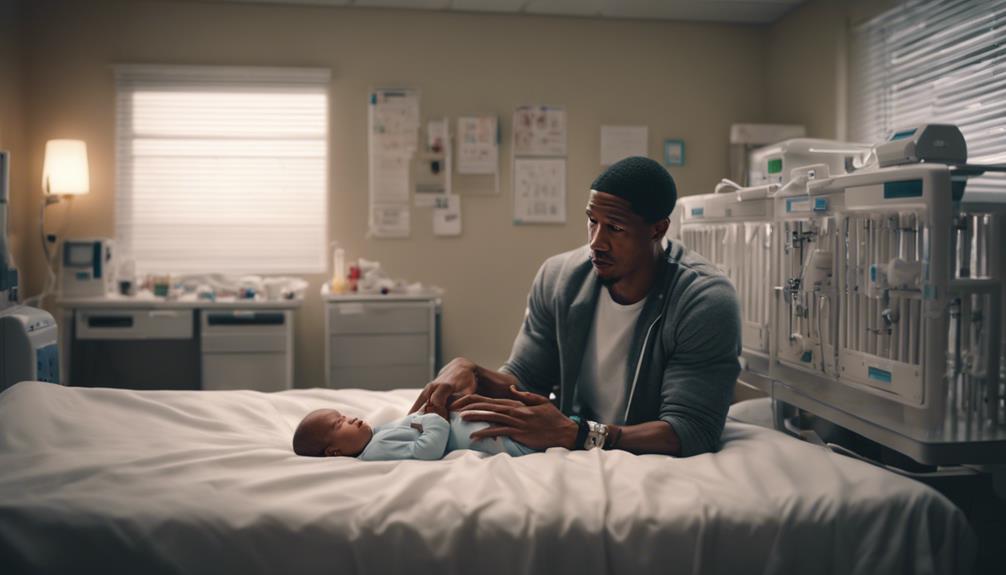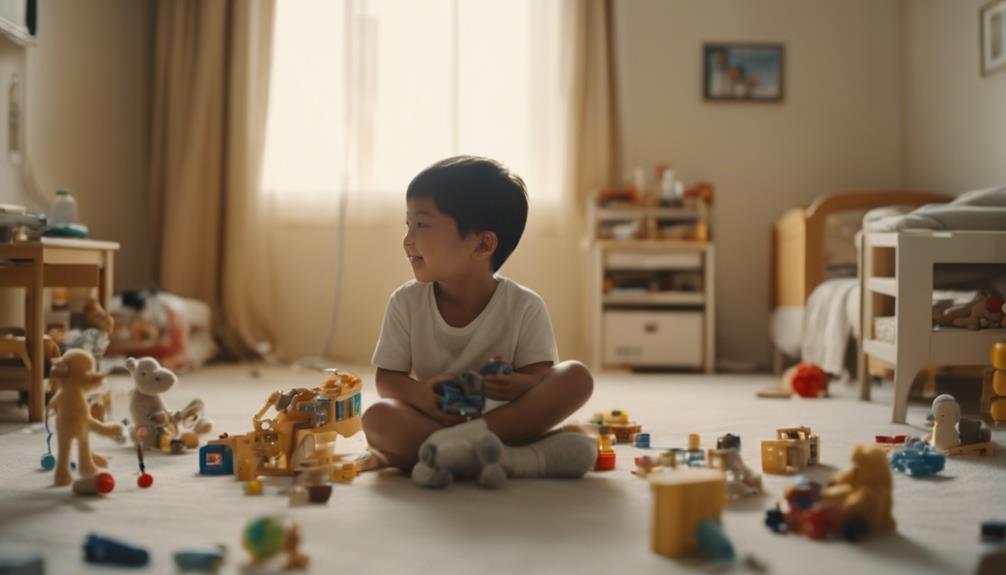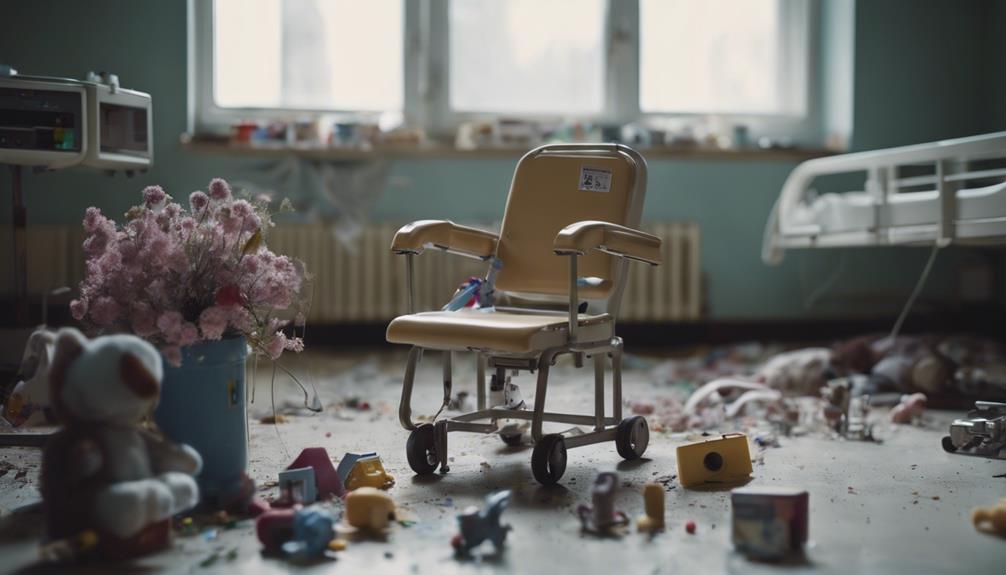Nick Cannon opted out of chemotherapy for his five-month-old son Zen, who was diagnosed with a cancerous brain tumor, due to the treatment's limited benefits and potential harm to the infant's fragile body. Chemotherapy would have only extended Zen's life by 3-4 years, and Nick, who has personal experience with the treatment for his Lupus, prioritized his son's quality of life over a potentially prolonged but painful existence. With newborns' bodies too delicate for chemotherapy and their immune systems still developing, Nick chose to prioritize comfort and well-being over aggressive treatment. This decision was driven by love and a desire to spare Zen unnecessary suffering, and there's more to explore about the Cannon family's heartbreaking journey.
Key Takeaways
• Nick Cannon chose not to put his son Zen through chemotherapy due to the limited 3-4 year life extension it would provide.
• Nick's personal experience with chemotherapy for Lupus influenced his decision to prioritize Zen's quality of life over extended lifespan.
• Newborns' fragile bodies and developing immune systems make them vulnerable to the negative effects of chemotherapy.
• Nick prioritized Zen's comfort and happiness over a prolonged but potentially painful existence.
• The decision was driven by love for the child and a desire to prioritize quality of life over a prolonged but painful existence.
A Heartbreaking Diagnosis
At just five months old, Zen received a devastating diagnosis: a cancerous brain tumor that would drastically alter the course of his young life. This heart-wrenching news sent shockwaves through the Cannon family, leaving Nick and his loved ones reeling.
The diagnosis brought with it a slew of difficult decisions, including whether to pursue chemotherapy treatment for the infant. However, doctors advised that chemotherapy wouldn't notably extend Zen's life, with the best-case scenario being a life expectancy of only 3-4 years. Nick Cannon, determined to prioritize his son's quality of life, made the difficult decision to forgo chemotherapy. This choice was influenced by Nick's personal experience with chemotherapy, which likely played a significant role in his decision-making process.
As the Cannon family navigated this trying time, they remained committed to ensuring Zen's remaining time was filled with love, comfort, and care.
The Devastating Brain Tumor

What exactly was this brain tumor that had taken over Zen's young life, and how did it come to dominate the Cannon family's world? At just five months old, Zen was diagnosed with a cancerous brain tumor, a devastating blow to Nick Cannon and his family. The diagnosis brought with it a multitude of questions and concerns, not the least of which was the best course of treatment.
| Treatment Option | Life Expectancy | Quality of Life |
|---|---|---|
| Chemotherapy | 3-4 years | Low |
| No Chemotherapy | Shortened | High |
| Palliative Care | Shortened | High |
| Experimental Treatment | Unknown | Unknown |
Nick Cannon, having had personal experience with chemotherapy, prioritized Zen's quality of life over pursuing chemotherapy treatment. The decision was not taken lightly, as doctors advised that chemotherapy wouldn't notably extend Zen's life. The best-case scenario with chemotherapy was a life expectancy of 3-4 years for Zen. Nick's personal experience with chemotherapy influenced his decision, as he knew the harsh realities of the treatment.
Chemotherapy's Limited Benefits

Additionally, the limited benefits of chemotherapy are evident in the marginal gains in lifespan it would have offered Zen. Even with treatment, doctors predicted Zen's life expectancy would only increase by a mere 3 to 4 years, a sobering reality that weighed heavily on Nick Cannon's decision.
Moreover, the temporary quality of life improvements from chemotherapy would have come at a significant cost to Zen's overall well-being.
Limited Lifespan Gains
Doctors' forecasts indicated that chemotherapy would, at best, extend Zen's life by a mere three to four years, a limited gain that ultimately influenced Nick Cannon's decision to forgo the treatment. This prognosis led Nick Cannon to prioritize his son's quality of life over a potentially extended lifespan.
Drawing from his personal experience with chemotherapy for his own health condition, Nick understood the emotionally and physically draining nature of the treatment. He chose to spare Zen from such a difficult process, opting instead to focus on maximizing the child's quality of life during his remaining time.
Nick Cannon and Alyssa Scott made the difficult decision to forgo chemotherapy, acknowledging that the potential benefits were limited and the negative impacts on Zen's well-being were significant. By prioritizing quality of life, Nick Cannon made a heart-wrenching but informed decision, one that was deeply personal and rooted in his own experience with the treatment.
Temporary Quality of Life
Nick Cannon's painful decision to forgo chemotherapy for his son Zen was largely driven by the treatment's limited benefits, which would have only temporarily prolonged his life. The estimated 3-4 year extension of life wasn't enough to justify the grueling effects of chemotherapy on the child's brain and overall quality of life.
Nick Cannon prioritized Zen's quality of life over the potential but limited benefits of chemotherapy, a decision influenced by his personal experience with the treatment for Lupus. The thought of putting a newborn like Zen through the draining effects of chemotherapy was unbearable for Cannon. Instead, he chose to maximize Zen's temporary quality of life, focusing on making the most of the time he'd with his son.
This decision highlights the difficult choices parents face when considering treatment options for their child, and the need to weigh the potential benefits against the potential costs to their child's quality of life.
A Father's Painful Experience

As he navigated the overwhelming reality of his infant son's cancer diagnosis, Cannon's heart ached at the thought of Zen undergoing the same draining chemotherapy treatments he'd endured for his own Lupus.
The father's painful experience was further complicated by the heartbreaking sight of his newborn son hooked up to machines. Nick Cannon emotionally struggled with the idea of a newborn undergoing chemotherapy, recalling the draining effects it had on his own body. Seeing Zen in this state led Cannon to prioritize his son's comfort and well-being over aggressive medical treatments.
This decision was influenced by doctors' advice that chemotherapy wouldn't notably extend Zen's life, with a best-case scenario of a life expectancy of 3-4 years. Cannon's experience with chemotherapy for Lupus treatment also played a role in his decision, as he prioritized Zen's quality of life over potential extended lifespan.
This painful experience has been a difficult journey for Nick Cannon, who's dedicated to ensuring his son's remaining time is filled with comfort and love.
Prioritizing Quality of Life

With a heavy heart, Cannon made the difficult decision to prioritize his son's quality of life over the potential extension of his lifespan. This decision was largely influenced by his own experience with chemotherapy, which gave him a unique perspective on the toll it can take on a person's body. Seeing his newborn son hooked up to machines was a heartbreaking sight for Nick, and he couldn't imagine putting Zen through the ordeal.
Prioritizing quality of life meant forgoing chemotherapy, despite doctors' estimates that it could extend Zen's life by 3 or 4 years. For Nick, the potential benefits didn't outweigh the potential costs to his son's well-being. This decision was likely a complex and emotional one, but ultimately, Nick chose to prioritize Zen's comfort and happiness over the possibility of a longer life.
Some key considerations that likely influenced Nick's decision include:
- The potential long-term effects of chemotherapy on Zen's health.
- The emotional toll of chemotherapy on both Zen and Nick.
- The quality of life Zen would experience during and after treatment.
- The potential impact of chemotherapy on Zen's overall happiness and well-being.
The Agony of Chemotherapy

Having witnessed the devastating effects of chemotherapy firsthand, Cannon couldn't bring himself to subject his newborn son to the same grueling process. As someone who's undergone chemotherapy for his Lupus treatment, Cannon knew the agony it entailed. He couldn't bear the thought of his son, Zen, going through the same ordeal. Witnessing his son hooked up to machines during treatment would be heartbreaking for Cannon, and he prioritized Zen's quality of life over a potential extended lifespan with chemotherapy.
The treatment would have been a harsh reality for the newborn, and Cannon couldn't fathom putting his family through that. Chemotherapy would have meant a significant reduction in Zen's quality of life, and Cannon wasn't willing to compromise on that. The thought of his son suffering through the side effects, only to extend his life by a few years, was unbearable for Cannon. He made the difficult decision to forgo chemotherapy, choosing to prioritize Zen's comfort and well-being over a potentially longer, but more agonizing, life.
A Newborn's Fragile Body

A newborn's body is particularly vulnerable due to its delicate immune system, which makes it susceptible to infections. Moreover, the fragile development of organs, such as the liver and kidneys, can hinder their ability to process and eliminate chemotherapy drugs.
This fragile state underscores the importance of carefully considering the potential consequences of chemotherapy on a newborn's body.
Delicate Immune System
Nick Cannon's decision to forego chemotherapy for his newborn son Zen was heavily influenced by the fragile state of Zen's delicate immune system, which made him more susceptible to harm from the aggressive treatment. As a newborn, Zen's body was already vulnerable, and introducing chemotherapy would have put a significant strain on his well-being. Nick prioritized Zen's quality of life over potential extended lifespan through chemotherapy.
Some key factors that contributed to Nick's decision include:
- Fragile body: Zen's newborn body was too fragile to withstand the aggressive treatment of chemotherapy.
- Emotional draining: Seeing Zen connected to medical equipment was emotionally draining for Nick, reinforcing his decision to avoid chemotherapy.
- Delicate immune system: Zen's immune system was still developing, making him more susceptible to harm from chemotherapy.
- Prioritizing well-being: Nick believed that subjecting Zen to chemotherapy would have been too challenging for a newborn, and decided to prioritize his son's well-being over potential extended lifespan.
Vulnerable to Infections
Newborns, like Zen, are extremely vulnerable to infections due to their fragile immune systems, which made chemotherapy a risky proposition. Nick Cannon was acutely aware of this vulnerability when considering treatment options for his son.
Chemotherapy can further weaken the immune system, increasing the risk of infections in newborns. This was a significant concern for Cannon, as Zen's young age and susceptibility to infections factored heavily into the decision not to pursue chemotherapy.
Maintaining Zen's health and quality of life without the added risk of infections was a top priority. With chemotherapy, the risk of infections would have been elevated, potentially compromising Zen's already fragile body. By forgoing chemotherapy, Cannon aimed to protect his son from further vulnerability to infections, preserving his quality of life.
This decision was rooted in the understanding that newborns, with their delicate immune systems, are particularly susceptible to infections, making chemotherapy a potentially harmful treatment option.
Fragile Organ Development
Developing organs in newborns like Zen are extremely fragile, making them highly susceptible to the intense and potentially devastating effects of chemotherapy. This delicate stage of organ development makes newborns vulnerable to the harsh side effects of chemotherapy, which can have long-lasting impacts on their overall health and quality of life.
The following factors highlight the risks of chemotherapy for newborns:
- Fragile organs: Newborns' organs are still developing, making them more prone to damage from chemotherapy.
- Delicate body: Newborns' bodies are sensitive to the intense treatments involved in chemotherapy, which can be overwhelming for their delicate systems.
- Vulnerable immune systems: Newborns' immune systems are still maturing, making them more susceptible to infections and other complications from chemotherapy.
- Intense treatments: Chemotherapy can be particularly challenging for newborns, whose bodies are still adapting to the outside world.
Considering these factors, the decision to avoid chemotherapy for Zen prioritized his well-being and quality of life, recognizing that his fragile state required a more gentle approach to treatment.
Choosing Comfort Over Treatment

When faced with the devastating diagnosis of a brain tumor, Zen's parents had to weigh the potential benefits of chemotherapy against the potential toll it would take on their newborn's quality of life. Nick Cannon, having undergone chemotherapy himself for Lupus, understood the grueling effects it would have on Zen.
Doctors advised that chemotherapy wouldn't markedly extend Zen's life, leading Nick to prioritize his son's comfort over potential extended lifespan. The thought of a newborn like Zen going through the draining effects of chemotherapy was unbearable for Nick. Witnessing Zen hooked up to machines during medical procedures further solidified Nick's decision against chemotherapy.
He chose to focus on maintaining his son's quality of life, opting for comfort over treatment. This difficult decision was likely influenced by Nick's personal experience with chemotherapy and his desire to spare Zen from unnecessary suffering. By choosing comfort over treatment, Nick ensured that Zen's remaining time would be spent enjoying a decent quality of life, free from the harsh side effects of chemotherapy.
A Parent's Selfless Decision

With a heavy heart, Nick Cannon made the agonizing decision to forgo chemotherapy for his infant son Zen, opting instead to prioritize the baby's quality of life over a potentially prolonged but painful existence.
This selfless decision wasn't taken lightly, as Nick considered the potential consequences of chemotherapy on his newborn son. Having undergone chemotherapy himself for Lupus, Nick was acutely aware of the toll it would take on Zen's young body.
Doctors had advised that chemotherapy wouldn't greatly extend Zen's life expectancy, further solidifying Nick's decision. By choosing to prioritize Zen's quality of life, Nick ensured that his son's remaining time would be filled with comfort and love, rather than pain and suffering.
Key factors influencing Nick's decision:
- Doctors' advice: Chemotherapy wouldn't greatly extend Zen's life expectancy.
- Personal experience: Nick underwent chemotherapy for Lupus and understood its effects.
- Quality of life: Nick prioritized Zen's comfort over a potentially prolonged existence.
- Parental love: Nick's selfless decision was driven by his love for his son.
Frequently Asked Questions
Did Nick Cannon Go Through Chemotherapy?
Nick Cannon, the American actor and television host, underwent chemotherapy as part of his treatment for lupus. This experience likely influenced his decision-making regarding his son Zen's treatment.
Having gone through the process himself, Cannon understood the rigors of chemotherapy, which may have factored into his choice to prioritize Zen's quality of life over potentially extending his lifespan through chemotherapy.
What Type of Brain Cancer Did Nick Cannon's Son Have?
When life gives you lemons, make lemonade – but in Nick Cannon's case, he'd to make a heart-wrenching decision for his son Zen.
The type of brain cancer Zen had was a significant factor in the decision-making process regarding his treatment options.
Unfortunately, the exact type of brain cancer remains undisclosed, leaving the public in the dark about the specifics of Zen's diagnosis.
Did Alyssa Scott's Son Have Brain Cancer?
Alyssa Scott's son, Zen, was diagnosed with a cancerous brain tumor at just 5 months old. His diagnosis was a devastating blow to his parents, Nick Cannon and Alyssa Scott.
The tumor's presence signaled a life-threatening condition, prompting an important decision regarding his treatment.
When Was Zen Cannon Diagnosed With Cancer?
Zen Cannon, the infant son of Nick Cannon, was diagnosed with cancer at a mere five months old.
This devastating diagnosis came at an extremely young age, and the subsequent treatment decisions would have a profound impact on the child's life.
Conclusion
Nick Cannon's decision to forgo chemotherapy for his son Zen, who tragically passed away from a brain tumor, was rooted in his commitment to prioritizing quality of life.
Research suggests that chemotherapy's benefits are limited for infants, and its aggressive treatment can be detrimental to their fragile bodies.
By choosing comfort over treatment, Cannon made a selfless decision, acknowledging that the potential harm of chemotherapy outweighed its potential benefits, and instead, focused on providing his son with a peaceful and loving environment in his final days.










